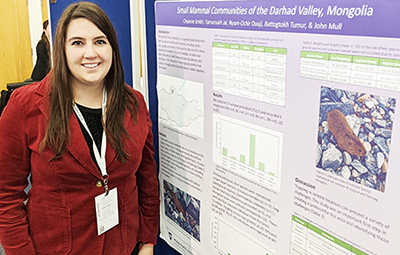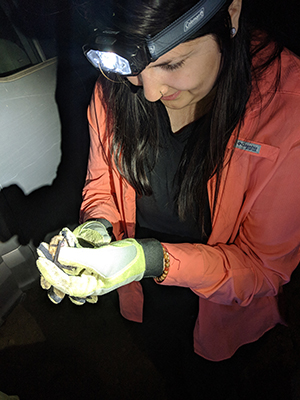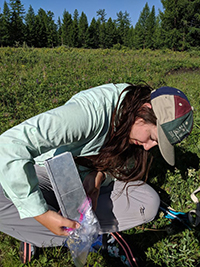WSU Zoology Student Earns National Science Foundation Graduate Research Fellowship
OGDEN, Utah – A Weber State University zoology student has received a major science award to research a small rodent impacted by drought in Central Chile.
 Chyanne Smith was awarded the prestigious National Science Foundation (NSF) Graduate Research Fellowship Program (GRFP) to conduct her research on the degu (Octodon degus) in Santiago, Chile, as part of her master’s program in environmental science at The University of Tennessee at Chattanooga.
Chyanne Smith was awarded the prestigious National Science Foundation (NSF) Graduate Research Fellowship Program (GRFP) to conduct her research on the degu (Octodon degus) in Santiago, Chile, as part of her master’s program in environmental science at The University of Tennessee at Chattanooga.
Smith said the award is for research that focuses on how physiological mechanisms, which help control an organism’s chemistry and biology, underlie variation in the social behavior of degus. Degus are social rodents that live in large groups.
“Specifically, we will investigate maternal effects on the water-balance physiology of degu pups,” Smith said. “In other words, we are looking at the conditions a mother degu faces and how the conditions may be internally communicated to her young to better prepare the pups for survival.”
Zoology professor and mentor John Mull said this species of rodent is considered an important research model for understanding human biology, especially certain aspects of physiology and aging.
“Central Chile is currently in the throes of a megadrought that has been linked to climate change, and degu colonies are declining during the drought,” Mull said. “Chyanne’s research will have implications for understanding how social animals respond to severe climate change.”
 The prestigious NSF grants, which include tuition and a stipend, often are awarded to students at Research I institutions, such as MIT, Harvard, Stanford and Purdue.
The prestigious NSF grants, which include tuition and a stipend, often are awarded to students at Research I institutions, such as MIT, Harvard, Stanford and Purdue.
Smith, who graduates in April, said Weber State offered her significant research experience, including a semester-long project as part of Mull’s animal behavior course, and a summer in Mongolia studying small mammal communities in the Darhad, Valley.
She presented her findings from Mongolia at the 2020 Utah Conference on Undergraduate Research. At the 2019 conference, Smith had presented her findings on the caching behavior of woodrats through maturity with zoology professor Michele Skopec.
Since she was a child, Smith said she’s always loved animals, particularly rodents, and wanted to know what they were thinking, doing and why.
“This research gives me the ability to explore some of those “why” questions,” she said. “Often, when I tell people I work with rodents, they are put off, and they don’t see the value, but rodents play an important role in an ecosystem. Understanding their behaviors can also give insight into human behavior and evolution.”
Smith returned to school while working in a highly paid position at a multinational computer technology corporation. She left the tech industry behind when her studies and research confirmed that she had made the right decision to pursue her passion for animal research.
Dean of the College of Science Andrea Easter-Pilcher described Chyanne as a stellar student. “Chyanne has a solid vision of who she wants to be as a professional,” Easter-Pilcher said. “She has pursued her vision with tenacity and enthusiasm.”
 With a long history of successful recipients, the GRFP is the oldest graduate fellowship program that provides direct support to graduate students in various fields of science, technology, engineering and math (STEM).
With a long history of successful recipients, the GRFP is the oldest graduate fellowship program that provides direct support to graduate students in various fields of science, technology, engineering and math (STEM).
The award citation notes that the program assists fellows to become lifelong leaders in scientific innovation and teaching. Smith will share in the prestige and opportunities that become available to those selected. Past fellows include numerous Nobel Prize winners.
“My core goal has always been to obtain a position that helps animals in some way,” Smith said. “The Weber State University College of Science and the Department of Zoology have provided me all the opportunities I needed to be successful.”
For photos, visit the following links:
photos.smugmug.com/Press-Release-Photos/2020-photos/April-2020/i-Qg9Jbnz/0/a554110b/X2/Presenting-X2.jpg
photos.smugmug.com/Press-Release-Photos/2020-photos/April-2020/i-GLC3VRB/0/717f8d61/X2/trapping-X2.jpg
photos.smugmug.com/Press-Release-Photos/2020-photos/April-2020/i-w3pLt4z/0/a16bd5b2/X2/Yellowstone-X2.jpg
photos.smugmug.com/Press-Release-Photos/2020-photos/April-2020/i-DT7qjS6/0/8e8f586c/X2/Bat-X2.jpg
Visit, weber.edu/cos for more news about the College of Science.
Visit weber.edu/wsutoday for more news about Weber State University.
Ali Miller, College of Science
801-698-4599 • amiller@weber.edu- Contact:
John Mull, zoology professor
435-890-7304 • jmull@weber.edu